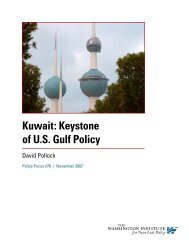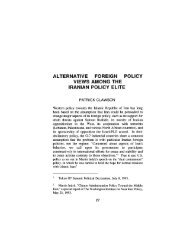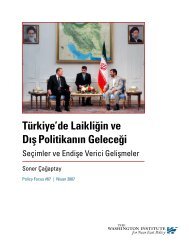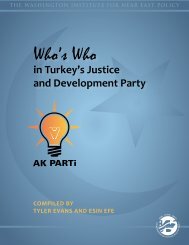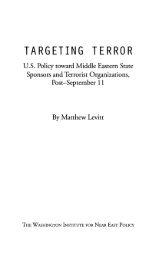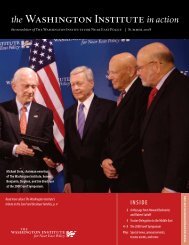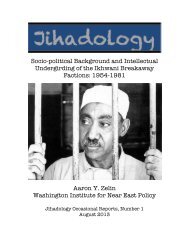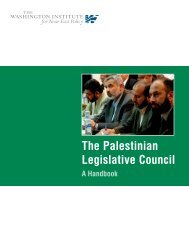Michael Eisenstadt David Pollock How the United States Benefits ...
Michael Eisenstadt David Pollock How the United States Benefits ...
Michael Eisenstadt David Pollock How the United States Benefits ...
Create successful ePaper yourself
Turn your PDF publications into a flip-book with our unique Google optimized e-Paper software.
Executive Summary<br />
THE U.S.-ISRAEL special relationship has traditionally<br />
been defined in terms of a moral obligation,<br />
shared values, and common interests. During<br />
<strong>the</strong> Cold War, Israel also came to be seen as<br />
a strategic asset that served as a bulwark against<br />
Soviet influence and a counter to radical Arab<br />
nationalism. U.S. military assistance to Israel contributed<br />
to peace treaties with Egypt and Jordan,<br />
and has deterred <strong>the</strong> outbreak of major interstate<br />
Arab-Israeli conflicts since 1982. The U.S.-Israel<br />
relationship likewise has helped spur closer U.S.-<br />
Arab ties ever since <strong>the</strong> 1973 war, because most<br />
Arabs have believed that only <strong>the</strong> <strong>United</strong> <strong>States</strong><br />
could deliver <strong>the</strong> Israeli concessions that <strong>the</strong>y<br />
required for a peace agreement. Yet since <strong>the</strong> end<br />
of <strong>the</strong> Cold War, some in <strong>the</strong> <strong>United</strong> <strong>States</strong>—and<br />
Israel—have preferred not to discuss <strong>the</strong> details of<br />
<strong>the</strong> security relationship, at least in public, because<br />
it was feared that it would disrupt U.S. cooperation<br />
with Arab and Muslim allies. As a result, many<br />
of <strong>the</strong> benefits of U.S.-Israel security cooperation<br />
have gone unrecognized.<br />
A decade after 9/11, however, al-Qaeda is a fragmented,<br />
weakened organization. And while <strong>the</strong><br />
war on al-Qaeda and its affiliates is far from over,<br />
<strong>the</strong> <strong>United</strong> <strong>States</strong> faces a changed, more complex<br />
security environment. It is defined not only by <strong>the</strong><br />
“hard” security challenges posed by terrorism and<br />
conventional/hybrid military threats, but also by<br />
new and emerging “soft” security challenges related<br />
to economic competitiveness, <strong>the</strong> information<br />
technology revolution, sustainability (i.e., water<br />
and food security, and <strong>the</strong> quest for energy alternatives),<br />
and public health. All of <strong>the</strong>se challenges<br />
will test U.S. resilience and require broad international<br />
cooperation if <strong>the</strong>y are to be solved. Israel<br />
is one of <strong>the</strong> few countries positioned to help <strong>the</strong><br />
<strong>United</strong> <strong>States</strong> deal with both <strong>the</strong>se traditional and<br />
emerging security challenges.<br />
The Enduring Strategic Logic<br />
Many of <strong>the</strong> considerations that provided <strong>the</strong><br />
rationale for <strong>the</strong> U.S.-Israel security relationship<br />
during <strong>the</strong> Cold War remain valid today. Israel is<br />
a bulwark against radical Islamism in <strong>the</strong> Levant,<br />
as embodied by Hamas and Palestinian Islamic<br />
Jihad, and a quiet but effective ally of Jordan. U.S.<br />
military support helps bolster Israeli deterrence<br />
against hostile state and nonstate actors, while<br />
military equipment pre-positioned in Israel, valued<br />
at nearly $1.2 billion, is available to support<br />
U.S. contingencies in <strong>the</strong> eastern Mediterranean<br />
and Persian Gulf. Likewise, Israel continues to<br />
serve as a testing ground for advanced weapons<br />
and war-fighting concepts, many of which are<br />
eventually employed by <strong>the</strong> <strong>United</strong> <strong>States</strong>. Washington,<br />
for its part, is still seen as an address for<br />
Arabs seeking to influence Israeli policies, while<br />
Israel is still seen as an address for some Arabs<br />
seeking to influence Washington.<br />
Israel is <strong>the</strong> only de facto nuclear weapons state<br />
in <strong>the</strong> region. While Israel’s bomb may have contributed<br />
to initial, unsuccessful attempts at nuclear<br />
proliferation by Egypt, Libya, and Syria, its policy of<br />
opacity also made it easier for some of <strong>the</strong>se countries<br />
to subsequently forgo nuclear weapons. And its<br />
policy of prevention in <strong>the</strong> region has precluded <strong>the</strong><br />
emergence of additional nuclear weapons states in<br />
Iraq (1981) and Syria (2007)—at least thus far.<br />
The relationship with Israel has not been without<br />
risks for Washington, or without costs for <strong>the</strong><br />
<strong>United</strong> <strong>States</strong> in terms of its standing in Arab and<br />
Muslim states. The 1973 October War nearly led<br />
to a confrontation between <strong>the</strong> <strong>United</strong> <strong>States</strong> and<br />
<strong>the</strong> Soviet Union, while <strong>the</strong> emergency resupply of<br />
Israeli forces during <strong>the</strong> war prompted an Arab oil<br />
embargo. The 1982 Israeli invasion of Lebanon led to<br />
an ill-fated U.S. intervention in Lebanon and helped<br />
catalyze <strong>the</strong> emergence of Hizballah, which has<br />
The WashingTon insTiTuTe for near easT Policy ix



